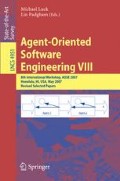Abstract
Agent-oriented software engineering can be viewed as applying software engineering principles to agent-oriented development or applying agent-oriented principles to software engineering. In this paper, we are more concerned with the second view. We describe how prototype systems can be efficiently created from agent-oriented domain and design models. We propose a conceptual space that accommodates model transformations described by the Model-Driven Architecture. We explain agent-oriented domain models and platform-independent design models and show how the first can be mapped to the latter. We demonstrate how design models can be turned into the implementation of an agent-based prototype on a specific platform. The approach has potential for accelerating the process of rapid prototyping.
Access this chapter
Tax calculation will be finalised at checkout
Purchases are for personal use only
Preview
Unable to display preview. Download preview PDF.
References
MDA Guide Version 1.0.1. Retrieved February 3, 2007, from http://www.omg.org/cgi-bin/doc?omg/03-06-01
Barak, D., Harel, D., Marelly, R.: InterPlay: Horizontal scale-up and transition to design in scenario-based programming. IEEE Trans. Soft. Eng. 32(7), 467–485 (2006)
Juan, T., Sterling, L.: The ROADMAP meta-model for intelligent adaptive multi-agent systems in open environments (Revised Papers). In: Giorgini, P., Müller, J.P., Odell, J.J. (eds.) AOSE 2003. LNCS, pp. 826–837. Springer, Heidelberg (2004)
Kuan, P.P., Karunasakera, S., Sterling, L.: Improving goal and role oriented analysis for agent based systems. In: Proceedings of the 16th Australian Software Engineering Conference (ASWEC 2005), Brisbane, Australia, 31 March – 1 April 2005, pp. 40–47. IEEE Computer Society Press, Los Alamitos (2005)
Castelfranchi, C., Falcone, R.: From automaticity to autonomy: The frontier of artificial agents. In: Hexmoor, H., Castelfranchi, C., Falcone, R. (eds.) Agent Autonomy, pp. 103–136. Kluwer Academic Publishers, Dordrecht (2003)
Rao, A.S., Georgeff, M.P.: Modeling rational agents within a BDI architecture. In: Allen, J., Fikes, R., Sandewall, E. (eds.) Proceedings of Knowledge Representation 91 (KR-91), pp. 473–484. Morgan Kaufmann, San Francisco (1991)
Shoham, Y.: Agent-Oriented Programming. Artificial Intelligence 60(1), 51–92 (1993)
Wagner, G., Schroeder, M.: Vivid agents: Theory, architecture, and applications. Journal of Applied Artificial Intelligence 14(7), 645–675 (2000)
Taveter, K.: A multi-perspective methodology for agent-oriented business modelling and simulation. PhD thesis, Tallinn University of Technology, Estonia (ISBN 9985-59-439-8) (2004)
Henderson-Sellers, B., Giorgini, P. (eds.): Agent-oriented methodologies. Idea Group (2005)
Taveter, K., Wagner, G.: Towards radical agent-oriented software engineering processes based on AOR modelling. In: [10], pp. 277–316
Unified Modeling Language: Superstructure. Version 2.0, Retrieved February 5, 2007 (August, 2003), from http://www.omg.org/cgi-bin/doc?ptc/2003-08-02
Bellifemine, F., Poggi, A., Rimassa, G.: Developing multi-agent systems with a FIPA-compliant agent framework. Software - Practice and Experience 31, 103–128 (2001)
Padgham, L., Winikoff, M.: Developing intelligent agent systems. John Wiley & Sons, Chichester (2004)
Jayatilleke, G.B., Padgham, L., Winikoff, M.: A model driven component-based development framework for agents. Comput. Syst. Sci. & Eng. 20(4) (2005)
Kuutti, K.: Activity Theory as a potential framework for human-computer interaction research. In: Nardi, B. (ed.) Activity Theory and Human Computer Interaction, pp. 17–44. MIT Press, Cambridge (1995)
Rahwan, I., Juan, T., Sterling, L.: Integrating social modelling and agent interaction through goal-oriented analysis. Comput. Syst. Sci. & Eng. 21(2), 87–98 (2006)
DeLoach, S.A., Kumar, M.: Multi-agent systems engineering: An overview and case study. In: [10], pp. 317–340
Zambonelli, F., Jennings, N.R., Wooldridge, M.: Multi-agent systems as computational organizations: The Gaia methodology. In: [10], pp. 136–171
Caire, G., Coulier, W., Garijo, F., Gomez-Sanz, J., Pavon, J., Kearney, P., Massonet, P.: The MESSAGE methodology. In: Bergenti, F., Gleizes, M.-P., Zambonelli, F. (eds.) Methodologies and Software Engineering for Agent Systems: The Agent-Oriented Software Engineering Handbook, pp. 177–194. Kluwer Academic Publishers, Dordrecht (2004)
Cossentino, M.: From requirements to code with the PASSI methodology. In: [10], pp. 79–106
Iglesias, C. A., Garijo, M. The agent-oriented methodology MAS-CommonKADS. In: [10], pp. 46–78.
Sterling, L., Taveter, K.: The Daedalus Team. Building agent-based appliances with complementary methodologies. In: Tyugu, E., Yamaguchi, T. (eds.) Knowledge-Based Software Engineering: Proceedings of the Joint Conference on Knowledge-Based Software Engineering, Tallinn, Estonia, August 28-31, 2006, pp. 223–232. IOS Press, Amsterdam (2006)
Taveter, K., Wagner, G.: Agent-oriented modelling and simulation of distributed manufacturing. In: Rennard, J.-P. (ed.) Handbook of Research on Nature Inspired Computing for Economy and Management, pp. 541–556. Idea Group (2006)
Penserini, L., Perini, A., Susi, A., Mylopoulos, J.: From stakeholder intentions to software agent implementations. In: Dubois, E., Pohl, K. (eds.) CAiSE 2006. LNCS, vol. 4001, pp. 465–479. Springer, Heidelberg (2006)
Kasinger, H., Bauer, B.: Towards a model-driven software engineering methodology for organic computing systems. In: Hamza, M.H. (ed.) Computational Intelligence: IASTED International Conference on Computational Intelligence, Calgary, Alberta, Canada, July 4–6, 2005, pp. 141–146. IASTED/ACTA Press (2005)
Taveter, K.: A Technique and Markup Language for Business Process Automation. In: Proceedings of the Workshop on Vocabularies, Ontologies, and Rules for The Enterprise (VORTE 2006), held in conjunction with the Tenth IEEE International EDOC (The Enterprise Computing) Conference, Hong Kong, 16–20 October 2006, IEEE Computer Society Press, Los Alamitos (2006)
Perini, A., Susi, A.: Automating model transformations in agent-oriented modeling. In: Müller, J.P., Zambonelli, F. (eds.) AOSE 2005. LNCS, vol. 3950, pp. 167–178. Springer, Heidelberg (2006)
Hahn, C., Madrigal-Mora, C., Fischer, K., Elvester, B., Berre, A.-J., Zinnikus, I.: Metamodels, models, and model transformations: Towards interoperable agents. In: Fischer, K., Timm, I.J., André, E., Zhong, N. (eds.) MATES 2006. LNCS (LNAI), vol. 4196, pp. 123–134. Springer, Heidelberg (2006)
Author information
Authors and Affiliations
Editor information
Rights and permissions
Copyright information
© 2008 Springer-Verlag Berlin Heidelberg
About this chapter
Cite this chapter
Taveter, K., Sterling, L. (2008). An Expressway from Agent-Oriented Models to Prototypes. In: Luck, M., Padgham, L. (eds) Agent-Oriented Software Engineering VIII. AOSE 2007. Lecture Notes in Computer Science, vol 4951. Springer, Berlin, Heidelberg. https://doi.org/10.1007/978-3-540-79488-2_11
Download citation
DOI: https://doi.org/10.1007/978-3-540-79488-2_11
Publisher Name: Springer, Berlin, Heidelberg
Print ISBN: 978-3-540-79487-5
Online ISBN: 978-3-540-79488-2
eBook Packages: Computer ScienceComputer Science (R0)

